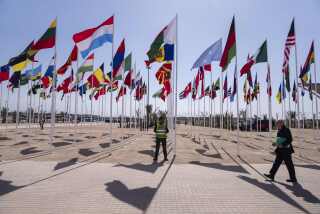Lending Spawns Third World Crisis, Study Says : Environment: IMF and World Bank policies have unintentionally speeded up a deterioration of some nations’ resources and health, it argues.
- Share via
WASHINGTON — Economic policies advocated by the World Bank and the International Monetary Fund are contributing to a Third World environmental crisis that is undermining the very development strategies the international lenders seek to promote, according to a study to be released today.
Unless the major lending institutions begin to factor environmental considerations into their planning, their economic development strategies for the Third World will in the long run prove to be self-defeating, a two-year study by the World Resources Institute warned. The institute is a Washington think tank that specializes in environmental and economic issues.
“Natural resources and environmental health are deteriorating at alarming rates in much of the developing world”--a trend that IMF and World Bank policies have unintentionally accelerated, institute president James Gustave Speth said in releasing the report, which was written by economists Wilfrido Cruz and Robert Repetto.
Although their study, touted by Speth as the first major effort to examine the environmental impact of macroeconomic planning, focused on the Philippines, its conclusions are relevant to other developing economies, including those of Eastern Europe and the former Soviet Union, the authors argued.
“Macroeconomic loans will continue to be important in the former Soviet Union . . . yet current IMF policy ignores the environmental impact” of such development strategies, said Repetto, the resource institute’s vice president and senior economist.
*
Cruz and Repetto said strategies devised to help the Philippines overcome a debt crisis in the 1980s actually undermined long-term recovery prospects by encouraging an exploitation of natural resources and environmental pollution.
The IMF stabilization program for the Philippines concentrated on developing the country’s industrial sector to reduce its growing foreign debt, “ignoring the decrease in natural assets” as exports were increased, Repetto said.
The emphasis on industrial development in the 1960s saw waves of workers immigrate from the countryside to Manila. But in the subsequent debt crisis of the 1980s, the tough economic medicine prescribed by the IMF, along with a decrease in exports caused by slumping world demand, forced many of the workers to re-migrate to forested areas and marginal lands in search of a living. The result was an increase in deforestation, over-fishing and soil erosion, the report said.
“The stabilization programs had the unintended effect of decreasing the assets side of the balance sheet,” Repetto said. “Liabilities in the form of debt were going up, while assets were being drawn down . . . (and) the Philippines became more and more vulnerable to external shocks, just like a highly leveraged company.”
If the effect of IMF and World Bank policies is to “reduce the resource base from which exports are derived, then the policies become self-defeating,” he added.
*
“The deterioration of a nation’s natural resource endowment is at least as serious an obstacle to sustainable development as the deterioration of its international credit standing,” the authors said.
The World Bank and the IMF, “as the main proponents of . . . macroeconomic policy reform in the developing world, should actively promote new analytical approaches that simultaneously address structural reform and environmental needs,” they added.
Briefing reporters, Repetto noted that the World Bank recently issued a report acknowledging a need to pay greater heed to the environmental consequences of macroeconomic planning. But he said it was still not being addressed in any of the institution’s ongoing country programs.
“A seed has been planted at the bank,” he said, “but it has not flowered and taken over the field yet.”
More to Read
Sign up for Essential California
The most important California stories and recommendations in your inbox every morning.
You may occasionally receive promotional content from the Los Angeles Times.










